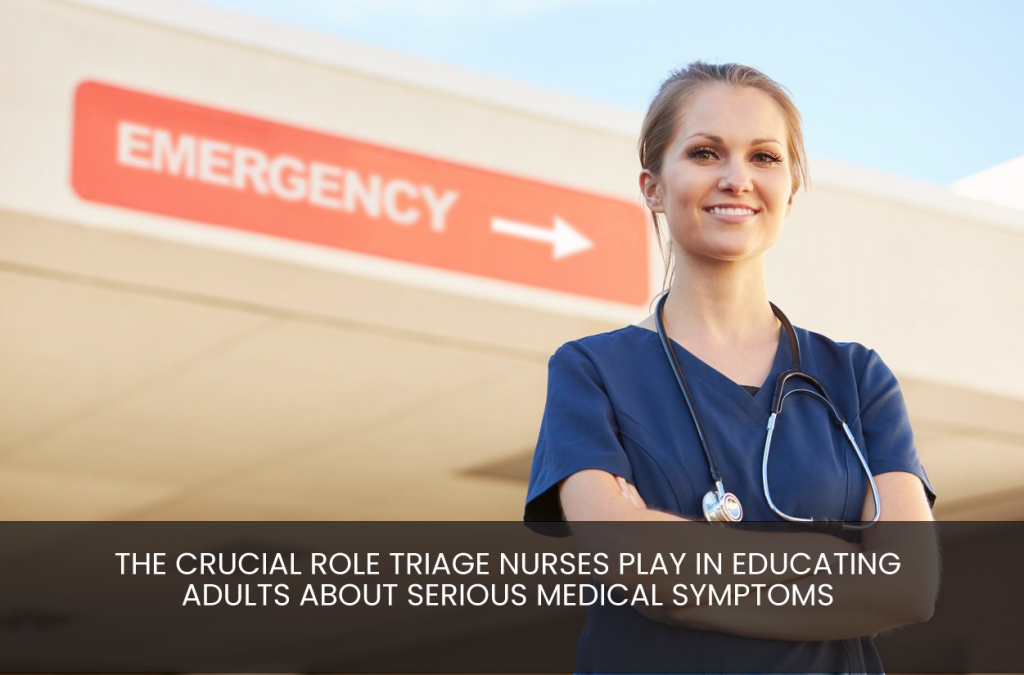When a medical emergency happens, not everyone calls 911. In a surprising study of patient surveys and disposition outcomes from telephone triage case, as many as one third of adult callers underestimated the seriousness of their symptoms. Even when adults have a sense that their symptom may be serious, there is a stigma of calling for an ambulance. Fortunately, having a triage nurse available increases the chances that a patient will seek help from a professional. Patients often will call a triage nurse when they are not sure about their symptoms because nurses provide an empathetic ear and support even if it is just a health question or a non-serious issue. As a result, this allows the nurse to triage a patient and catch serious symptoms that require immediate attention.
We highlight the top 10 reasons patients delay seeking treatment and the role of a telephone triage nurse when there is a real medical emergency. All patients should feel comfortable and unburdened to call a triage nurse. The biggest challenge is often getting the patient to make the first call because it depends on their understanding and sense of their symptoms and their overall level of motivation to seek help.
We recently interviewed our nurses at TriageLogic to get their insight. Here is what we discovered.

Typical Reasons Why Patients Don’t Seek Treatment in the Emergency Room
Don’t know what to do
Knowing about different medical symptoms plays a significant role in the process of seeking care. Patients attempt to match their symptoms to what they think they know about a given problem. This often leads to misinterpreted symptoms and underestimation of seriousness. See, for example, Anna’s case study.
Symptoms seem to be too mild to call 911
For example, a patient may feel “not quite right” or “fuzzy.” They did not think to call emergency services because they did not believe their symptoms were severe enough to call.
Fear of what the doctors will find
A lot of times individuals suspect something is wrong but decide to wait to see if the symptoms will resolve spontaneously. They ignore seeking medical attention, even when they know they have a life-threatening emergency.
Don’t want to inconvenience others
Adults are often afraid of being dependent on others in the future and don’t want to disrupt those around them. There is concern about taking up the time and resources of emergency services for symptoms that did not appear to be urgent and better used for other ‘more deserving’ cases. This again stems from a belief that their symptoms are not serious enough to warrant an emergency room trip.
Fear of hospitals
If a patient has had a previous negative experience calling 911 or in the hospital, they may be afraid of hospitals and not wanting to ‘bother’ medical services. A new study released at the 2019 American Stroke Association’s International Stroke Conference sheds light on the reasons why patients needing medical attention delay in calling for help. The most common cause by nearly one-third of the participants in the study chose not to seek help because they didn’t know where an ambulance would take them.
Fear of doctors and medical professionals
Latrophobia, or fear of doctors, is common. Most of us do not particularly enjoy going to the doctor and visits can cause anxiety. As a result, patients often ignore their symptoms hoping that it will go away and not require a medical visit.
Fear of being embarrassed
Surprisingly, our nurses have had several cases of patients not wanting to call an ambulance because they felt like they were causing a scene with EMT services arriving on their behalf. Some patients worry that will be perceived as a nuisance and denied services if they call too often.
Don’t want to ride in an ambulance
A large number of individuals prefer to have a family member drive them. In fact, more than one in three people who have a stroke don’t call 911 and instead rely on self-transport to get to the hospital. This creates an obvious potential danger to both the patient and to others on the road with them. Having a triage nurse educate about the seriousness of the symptom and the importance of getting an ambulance often leads a patient to comply and call an ambulance.
Too expensive
Older patients are often reluctant to call an ambulance or 911 because of the expense. Some individuals fail to call because they do not have insurance coverage or their deductibles are too high. Having a triage nurse to call first allows them to ensure that they truly need emergent care before calling one.
Don’t want to make the decision themselves
Patients often rely on a friend or relative not only to provide comfort and reassurance but also to take responsibility for engaging with emergency medical services. It is important for them to seek affirmation from others and a triage nurse line is a great way to get an educated professional help rather than other, less reliable sources.
The more informed the patient is about how to call the nurse triage line, the less the likely the patient will end up in the emergency room. There are many times when the triage nurse can redirect the caller to a less expensive treatment option that allows them to stay home and treat their symptoms.
What can Triage Nurses Do
A patient must feel that the nurse understands their condition and has their best interests at heart. From the very first encounter, communication plays a big part in building trust between the nurse and the patient.
Patients have very few “wants” from their healthcare providers – they want to feel respected, be heard, cared about, and included as a team player in their treatment plan. Surprisingly many of our callers are hesitant to go to the ER before the nurse takes the time to explain the importance of getting immediate care.
Do you want to learn more?
Please leave us comments on this article or questions below. For more information, visit our learning center for more information about early detection of health warnings in adults.
References:
https://www.rd.com/health/wellness/when-to-call-911/
https://www.webmd.com/first-aid/ss/slideshow-when-call-911
https://www.ncbi.nlm.nih.gov/pmc/articles/PMC3464281/
https://learn.triagelogic.com/advice-from-triage-nurses-on-early-health-warning-signs-for-adults/






